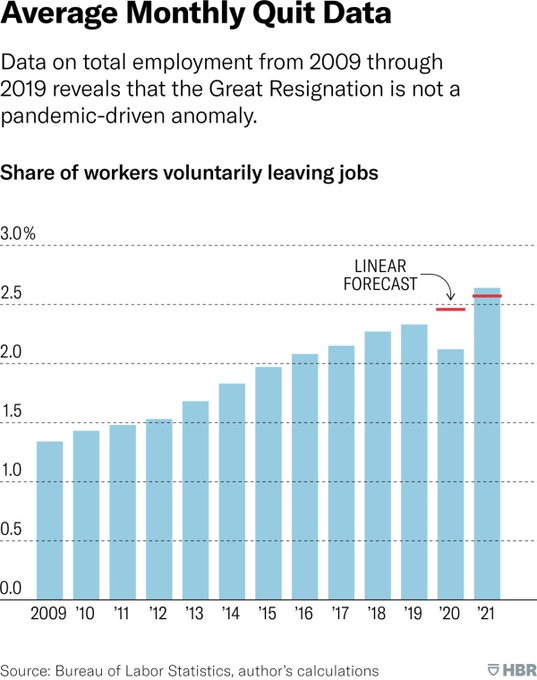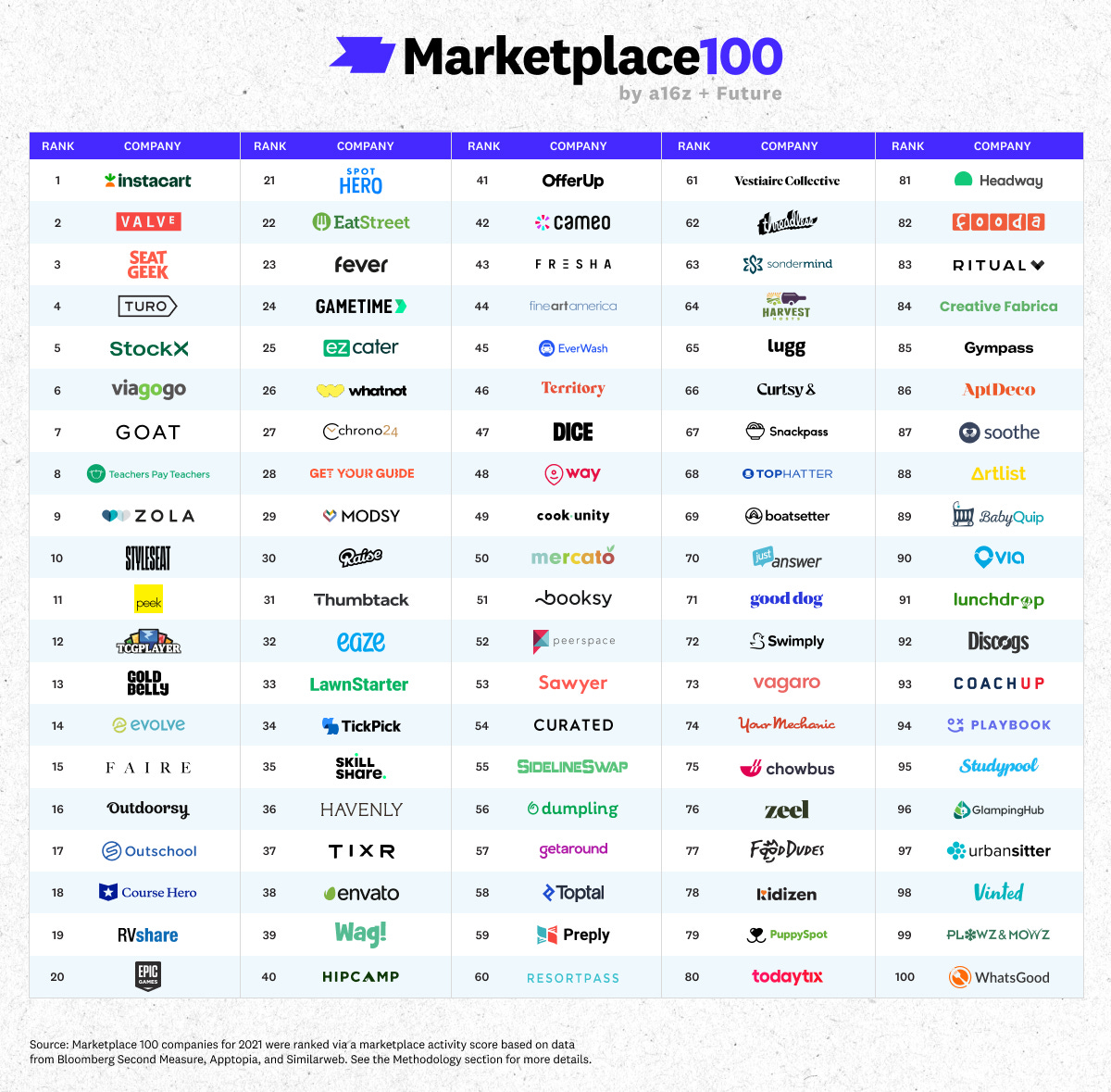Keeping an Eye on Markets, Musk and Misnomers
#WF29 Twitter as a Public Utility, Top 100 Marketplace Platforms and Why the term 'The Great Resignation' should be retired.
This week, I share some things that caught my eye from the fastest growing platforms, to why Elon Musk might want to buy Twitter, and why the term ‘great resignation’ should be retired.
Life is Tweet
“The people will believe what the media tells them they believe.” George Orwell
Elon Musk has made a $43 billion bid to buy Twitter.
Traditionally a rich man seeking more access and influence will buy a newspaper.
For example, Jeff Bezos bought The Washington Post in 2013 for $250m. In the UK, the family of Alexander Lebedev (Russian Oligarch and ex KGB) owns 63% of London’s Evening Standard and 41% of The Independent.
People might be less gullible than Orwell’s comment. However, the speed, breadth and power of social media has moved the focus of traditional power-players. Peoples’ opinion on elections, celebrities, and wars have been manipulated in a way that Don Draper, Goebbels, and, Warhol would have marvelled at. Regulators have been slow to respond to what is a relatively recent new communication channel.
Trust has eroded in traditional media…
So why does Elon Musk want to buy Twitter?
With Musk’s wealth and brand, all he needs to do to make a turn is to buy a stake in something, then tell people about it. Life is sweet.
But I’m not sure that’s the aim here.
He has 83m followers on Twitter - there’s no need for Tesla to pay influencers to sell its cars.
having a public platform that is maximally trusted and broadly inclusive is extremely important to the future of civilization. Elon Musk at a recent TED talk
He might restructure Twitter’s governance and ownership and effectively make it a public utility.
I’m sure he has plenty of product ideas too. This would be a model for other media platforms. This would convert Twitter into the people’s publication platform free from the incessant pressure of selling more advertising space to satisfy quarterly investors.
Musk already has an impressive 21st Century legacy. Transforming media might be an even more impactful legacy than the rockets🚀 and the plug-in 🚗 cars.
Time to Retire the Term ‘The Great Resignation’ ?
Back in July, I provided some commentary on the emerging ‘great resignation narrative’ based on some outlier monthly US payroll data. I noted that to understand complex global workforce trends it pays to look broadly and also at historical trends.

Joseph Fuller and William Kerr, share their research which supports that rising quit rates are part of a trend that began more than a decade ago.
They argue that five main factors are at play:-
Retirement, Relocation, Reconsideration, Reshuffling, and Reluctance.
Thankfully for those communicating these trends all the factors start with R.
All of these factors are here to stay, and their article is worth a read.
My take is that this is part of The Great Flourishing - workers are looking for more autonomy, flexibility and equity. In competitive industries, employers that don’t provide this will lose out.
You can read more about The Great Flourishing here, the push and pull factors, and how employers can respond.
The Marketplace 100
I find what goes on with marketplace platforms interesting.
They will drive a greater proportion of peoples’ income over the coming years, from teachers to dog-walkers and solopreneurs, as I highlighted in my essay, Unleashing The Decentralised Workforce.
The Marketplace 100 is a report by a16z and Future, and is a ranking of the largest consumer-facing start-ups and private companies.
The change in ranking from last year reflects what’s been happening in the wider economy - education has been in the ascendency, with travel temporarily in decline.
Some on the list from last year disappeared due to IPOs, or acquisition, including Coursera and Udemy.
There are three platforms in the Professional Services category. This includes Envato, digital assets for creative projects, Peerspace, and Toptal, for freelancers.
The Education category includes seven, including, Outschool, with over 1 million young learners and 140,000 interactive online classes. Plus CourseHero, SkillShare, Preply, JustAnswer, and StudyPool.
The pandemic has enabled a shift in our capability to educate millions of people using digital technology.
I am learning Portuguese at the moment and try and practice every day using my Duolingo app. It doesn’t replace real-life teachers, classes, or watching Brazilian soap operas. However, over the years, as methods and technology improve the scope for effective distributed education is unlimited. The barriers to entry reduce to nothing, opening up learning to billions. It’s an exciting prospect.
Storming up the Marketplace100 table is TeachersPayTeachers in at number 8. It’s a platform for teachers to buy and sell educational materials - with an impressive community of 7 million educators.
One thing to watch out for is the emergence of user-owned peer-to-peer platforms using tokenisation. These type of platforms will bring transaction fees down from 20% ish current levels and provide equity as an incentive to users and buyers.
NFT Marketplaces exploded last year, and I expect most to come back down to earth in 2022, as there is greater experience of their utility.
You can read the full report here.
Recreate the Sounds of the Office on Spotify
For those with Postmodern Workplace Blues - you can now recreate the sounds of the office with “The Sound of Colleagues” on Spotify. The most popular track appears to be “Rainy Day Inside the Calm Office”.
Clocking Off
Onalytica included me in their report on “Who is Who in the Future of Work” here is an interview I did with them.
Where #HRTech meets #FinTech - congratulations to Wagestream who raised $175m to fund growth. This technology enables workers to choose their own pay cycle, to manage their budgets, save for a rainy day, and chat to a personal money coach.










